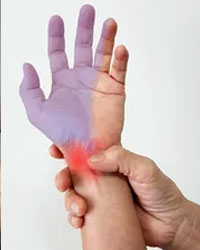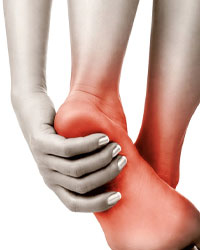Chronic Pain in Edmonton
Chronic pain is a persistent condition that affects millions of people, often interfering with daily life and well-being. Unlike acute pain, which is typically temporary and related to an injury or illness, chronic pain lasts for months or even years. It can affect various parts of the body and may be caused by a range of factors, including injury, illness, or underlying health conditions. Physiotherapy can be an essential part of managing chronic pain, focusing on improving mobility, reducing discomfort, and enhancing overall quality of life. Our clinic in Edmonton provides physiotherapy services to help individuals manage chronic pain effectively.
Common Causes of Chronic Pain
Chronic pain can stem from a variety of sources, and understanding the underlying cause is essential for effective treatment. Some of the most common causes of chronic pain include:
Arthritis
Arthritis causes inflammation in the joints, leading to pain, stiffness, and reduced mobility. Osteoarthritis and rheumatoid arthritis are the most common types that contribute to chronic pain, especially in the knees, hips, and hands.
Back and Neck Pain
Back and neck pain, whether due to injury, poor posture, or degenerative conditions, can lead to long-term discomfort. Chronic pain in these areas can be exacerbated by muscle tension, spinal misalignment, or herniated discs.
Migraines and Headaches
Chronic headaches and migraines are often accompanied by intense pain, nausea, and sensitivity to light and sound. They can last for hours or even days, significantly impacting daily activities.
Nerve Pain (Neuropathy)
Nerve-related pain, often caused by conditions like diabetes or nerve compression, can result in burning, shooting pain, or numbness in affected areas. This type of pain is often difficult to treat and can be persistent.
Fibromyalgia
Fibromyalgia is a condition that leads to widespread muscle pain, fatigue, and sleep disturbances. It can also cause headaches and joint pain and affect the body’s ability to recover from physical exertion.
Injuries or Trauma
Chronic pain can also arise after an injury or trauma, even after the original injury has healed. This condition, known as “post-traumatic pain,” can linger long after an accident or surgery.
Symptoms of Chronic Pain
Chronic pain can manifest in various ways, and its intensity can fluctuate from mild to severe. Common symptoms associated with chronic pain include:
- Persistent or recurring pain in one or more areas of the body
- Stiffness or limited mobility in affected joints or muscles
- Fatigue and difficulty sleeping due to discomfort
- Sensitivity to touch or temperature changes
- Difficulty concentrating due to ongoing discomfort
- Depression or anxiety, which can develop due to the ongoing nature of the pain
Chronic pain can significantly affect emotional well-being, leading to feelings of frustration, isolation, or helplessness.
How Physiotherapy Helps with Chronic Pain
Physiotherapy plays a critical role in the management of chronic pain by focusing on physical rehabilitation, movement improvement, and pain reduction. Through targeted treatment, physiotherapists can help individuals regain movement, strengthen muscles, and reduce the impact of pain. Some key physiotherapy approaches include:
Manual Therapy
Manual therapy involves hands-on techniques to relieve muscle tightness, improve joint mobility, and reduce pain. These techniques may include massage, stretching, and joint mobilizations to address areas of stiffness or discomfort.
Strengthening Exercises
Building strength in muscles that support painful areas can help reduce strain and improve overall function. Exercises designed to strengthen key muscle groups help to protect joints, improve posture, and minimize discomfort.
Stretching and Mobility Exercises
Gentle stretching exercises can improve flexibility and reduce stiffness, which is particularly beneficial for those experiencing joint pain or muscle tightness. Mobility exercises can also help improve movement and reduce the feeling of being “stuck” in painful positions.
Postural Training
Correcting posture is often a key component of managing chronic pain, particularly for back and neck issues. Physiotherapists can help individuals improve posture to avoid additional strain on the spine, muscles, and joints.
Education and Self-Management Techniques
Learning how to manage pain independently is a vital part of chronic pain treatment. Physiotherapists can provide education on pacing activities, ergonomics, and lifestyle modifications to help individuals cope with pain effectively.
Thermal and Electrical Modalities
Heat, cold, and electrical stimulation can be used to reduce inflammation, alleviate muscle tension, and promote healing. These therapies can complement physical exercises and manual techniques to provide more comprehensive pain relief.
The Role of Exercise in Chronic Pain Management
While it might seem counterintuitive, regular exercise is one of the most effective ways to manage chronic pain. Exercise helps to maintain joint mobility, strengthen muscles, and improve overall endurance. Low-impact exercises, such as swimming, walking, or cycling, are often recommended for individuals with chronic pain. Physiotherapists can create a tailored exercise program to ensure that movements are safe, effective, and appropriate for the individual’s specific condition.
Support for Chronic Pain in Edmonton
Living with chronic pain can be challenging, but with the right treatment, individuals can regain mobility, reduce discomfort, and improve their quality of life. Our clinic in Edmonton offers physiotherapy services designed to address a variety of chronic pain conditions, using evidence-based techniques to manage symptoms and enhance overall well-being.
If you are struggling with chronic pain, contact us today to schedule an appointment and begin your journey toward improved movement and pain management.















